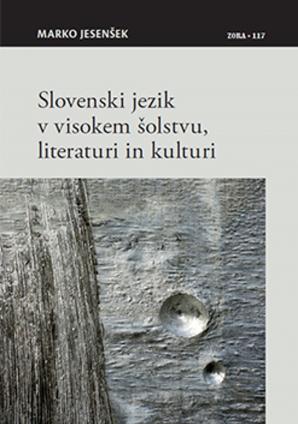Slovenski jezik v visokem šolstvu, literaturi in kulturi
Synopsis
Slovenian Language in Higher Education, Literature and Culture. Slovenian language in globalized (= commercialized) higher education - why at all and for how long? The skyscraper of the work of the Slovene university elite, the culprit for the (un) quality of Slovenian university education, the internationalization lane. Slovenian language in globalized (= commercialized) higher education - why at all and for how long? The skyscraper of the work of the Slovene university elite, the culprit for the (un) quality of Slovenian university education, the internationalization lane. Why is Slovenian, if English is more distinctive, excellent and above all comfortable in a uni-environment? The Rectors' Conference, Minister, Government, will the Members of Parliament join them and thus democratically abolish the culture "of which we are a part and which undoubtedly preserves our knowledge"? Slovenian language - useless usefulness? I believe not, because, like Nuccio Ordine, for Greek and Latin I repeat: the usefulness of the useless. The Englishisation of Slovenian higher education is an attempt to overcome the contentless, malicious communication in our university classrooms, such as "correctly / predicted / by Julien Gracq" when he announced in the article published in Le Monde des Livres on February 5, 2000, in the field of education a triumph of increasingly trivial communication based on the gradual introduction of English to the detriment of languages considered useless. " Namely, English is becoming (even in the minds of the work of the Slovenian uni-elite) "a kind of sophisticated Esperanto", a shortcut to "trivial communication", or as Julien Gracq perfectly illustrated with the word figure "a kind of can opener, universal passe-partout", ie. Duchamp's door, "which opened only one room while closing another." They do not realize that they prefer English language to Slovene, thus closing the door behind them - with foreign language learning we will lose the identity between consciousness and truth, we will start to accept a foreign way of thinking, a foreign, non-Slovenian culture, exiled and became non-Slovenian. And so we will re-introduce the familiar theme that Nuccio Ordine opened in his work The Usability of the Useless (Cankar's publishing house, 2015): "We will have a Slovenian without memory that will completely lose the sense of our own identity and our own history." thinking about the position of the Slovene language in higher education and it was shown that linguistic apostasy is occurring in Slovenia in every generation. It is increasingly difficult to prevent it, especially today, when the holders are referring to otherwise "positive" values, which, however, are adapted to the needs of commercialization of higher education. The Englishisation of Slovenian universities is a profit girl, which is why part of the Slovenian university is striving to expel it from the classrooms and restrict it to domestic use only. Toporisic most strongly condemned the apostasy, saying that "/ m / or languages have to shake off all the time - sometimes we had to German, then Serbo-Croatian, then Pan-Slavic ... now English." He noted where the waste of language leads and how it spreads. With a beautiful example ("Every language has its own home, and the home of Slovene is here"), he expressed the role and importance of the Slovene language in Slovenia and at Slovenian universities. Each language has its own home, and the home of Slovene is here. Yugoslavia - Anyone who comes here to learn Slovenian, just as our expats learn the language of the countries they immigrate to. This problem already existed in Kopitar's time when the Germans did not want to learn Slovenian, according to the view of an Englishman who realized: the colonialist should never speak the language of his subjects or those he colonizes! /… /. If they colonized you, you had to learn the language of the colonialists, so to speak their song, or you stayed out of paradise. This was a major problem in post-colonial Africa, which did not have a sufficiently large education layer. (Toporisic 2011: 107) Toporisic was aware that it was up to us to decide "to what extent we will preserve the language" in the global world. The European Union does not require Slovenian professors to introduce foreign language English classes for Slovenian students at Slovenian universities. This is the same position that we know from the SFRY in our "attitude towards Belgrade", because "we also had the right to speak Slovenian there, but few used it." Thus, it turns out that the current Anglicisation of Slovenian universities is linked, on the one hand, to the money and subconscious perceptions of a small nation that cause disruption, and, on the other, to the manipulation of non-experts who do not know what the language needs. Toporisic was adamant that lectures at Slovenian universities, even if only part of the study programs, would be in English, as he always argued that "one who comes here must adapt to Slovene and not the opposite." Will Toporisic's students and successors have the strength to prevent such linguistic apostasy? I hope so. In the first part of the monograph The Slovene Language in Higher Education, Literature and Culture
Downloads






